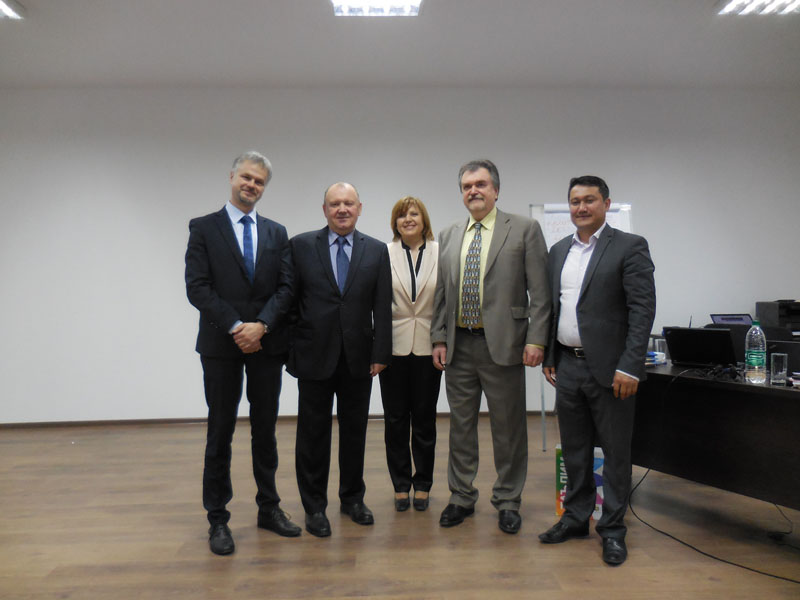
14.03.2017 | News
The 2nd International Women’s Entrepreneurship Laboratory in the Eastern Partner region will take place in Kyiv (Ukraine) on March 21-23, 2017. After the success of the 1st Women’s Entrepreneurship Laboratory in 2014 (Rome, Italy), European Training Foundation is happy to announce a follow-up event. It will be organised under the Platform II of Eastern Partnership (EaP). Its objective is to strengthen the existing regional synergies and build on the momentum created by latest SBA Assessment, and in line with SBA recommendations (see LINK to SME Policy Index 2016, Eastern Partner region). This “Laboratory” will strive to supply additional “energy” for a systematic SBA follow-up in the policy area of women’s entrepreneurship at the country and EaP region’s level, and provide a platform, an interim check-point of progress in preparation for the next SBA policy assessment (2018). The “Laboratory” aims to support the commitment of Eastern Partner governments and policy partners in promotion of women’s entrepreneurship and identify common policy targets that could be instrumental for exchange of know-how and cross-country peer learning. The “2nd International Women’s Entrepreneurship Laboratory in the Eastern Partner region” will create space for innovative and creative policy collaboration, informal networking, sharing good practice and expertise, and we hope to make it informal and oriented at very practical results. The Business Technologies Development Center traditionally participates in the Laboratory. In 2014 team of experts and trainers from the BTDC participated in the International Women’s Entrepreneurship Laboratory “Tomorrow’s Women Entrepreneurs: Insights for Innovative Policy and Practice in Human Capital Development in the EU’s Eastern Partner Region”. The event brought together experts, practitioners and policy makers from the...

21.07.2015 | News
On July 8, 2015 in Lviv Regional Institute of Postgraduate Pedagogical Education (LRIPPE, http://www.loippo.lviv.ua/) the training «Intel tools for educational policy making» for education leaders actively working on the educational policy development and implementation in Lviv region was held. Participants learned about Intel approaches and recommendations on the development of educational policy, determined the ICT role and instruments for its implementation, studied Intel® Education Transformation Policy Tool. The working group was formed of the representatives of LRIPPE, who are involed in educational development, ICT competencies education, impovement of qualifications of educational staff, representatives of the Education and Science Department of Lviv Regional State Administration, etc. The results of Working Group will be placed on a platform Intel® Education Transformation Policy Tool and are available for registered users: members of the working group, external experts (including international) invited to the project implementation. Participants determined the benefits of the proposed Intel instrument (presented both in print and online versions) during the training for the implementation of pointed tasks: ICT policy development – the basics of effective education systemtransformation. These, according to the working group members opinion include: – Clear and comprehensive policy model and step by step instructions for its implementation — A systematic approach to the education systemtransformation, implemented in seven interrelated components: leadership, school management, curriculum and assessment system of student achievements, professional development of teachers, ICT, research and evaluation, and resources — Availability of library resources (documents, videos, examples of best practices, etc.) to support the development, implementation and improvement of educational policy from more than 20 countries and the ability to add own resources, regional development plans, estimates, monitoring...

10.06.2015 | News
The UNESCO Tashkent office held a national workshop on ICT competencies standards development for teachers within the Regional Project of UNESCO “Supporting Competency-Based Teacher Trainings Reforms Facilitate ICT-Pedagogy Integration” from 7 to 10 April 2015 in Tashkent region, Uzbekistan. Participants of this workshop were experts in the field of ICT’s in education and policy-makers of the Ministry of Public Education, Ministry of Higher and Secondary Specialized Education, Centre for Secondary Specialized and Professional Education, Ministry of the Development of ICT’s of the Republic of Uzbekistan. The first day of the national workshop on 7 April was dedicated to Intel’s ICT Policy Tool, conceptual approaches and worldwide practices. The participants of the workshop followed all four phases of the policy development model: envisioning the future, developing country master plan of transformation of education, implementing programs and initiatives, evaluate and adapt the vision. Participants were asked to examine and discuss options for the development of ICT policy in education in Uzbekistan in addition to theoretical material provided. The trainers paid particular attention to the education transformation to meet the socio-economic needs in Uzbekistan, the key trends and strategies in educational policy development, ensuring resources for implementing the educational policy in Uzbekistan and the conditions of sustainable development of the national education policy. Participants received a detailed guide in printed and electronic versions, exchanged their contacts and ideas, gained new skills to use Intel four-phased policy development model. The first day of the workshop was held Tatyana Nanayeva, Intel Corporation Ukraine/CIS Corporate Affairs Manager, and Vladimir Ivanov director of the Business Technologies Development Centre (Kyiv). Detailed information about the Intel ICT Transformation...




